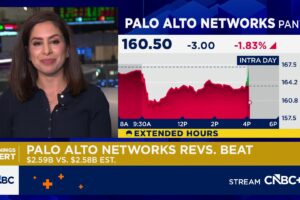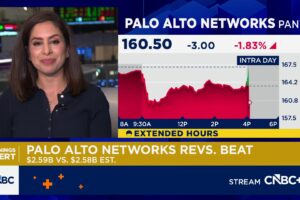The legacy retailer, once seen as slow to adopt technology as Amazon (AMZN) rose to the forefront, has quietly invested in everything from artificial intelligence and augmented reality to same-day delivery and cheap groceries. The combo punch has led to nearly four quarters of record earnings — and a title as Yahoo Finance’s annual Company of the Year award winner.
A committee of Yahoo Finance editorial leaders selected Walmart because of its strong year of sales and profits, financial outperformance relative to key rivals like Target (TGT), and a stock price that has reached fresh records in 2024.
“I’m a pretty conservative, kind of play-it-safe kind of person,” longtime CEO Doug McMillon said in an exclusive sit-down inside a Walmart supercenter near its Bentonville, Ark., headquarters.
“But to get the change that we needed, we had to take risks in the form of acquisitions, in the form of big investments. Those can be breathtaking at times, but that’s one way that I know I’ve changed — I’m faster to accept risks than I was before.”
McMillon, who climbed the ranks from loading Walmart trucks in his teens to the top of America’s largest retailer, is charging ahead as the business enters a 2025 fraught with uncertainties. Through the years, some Walmart lifers have gone so far as to paint McMillon as founder Sam Walton reincarnated — though the humble, deeply religious McMillon would never repeat those words.
Yet his vision has vaulted Walmart to the top of the Yahoo Finance stock charts, even as consumer sentiment struggles amid high inflation and the company deals with controversial decisions such as mandatory return to office and rolling back diversity, equity, and inclusion (DEI) initiatives.
In August, Walmart said it would cut prices on 7,200 products to maintain “competitive price gaps” with rivals. The result? The company trounced cheap-chic rival Target in its third quarter despite Target’s own slew of price cuts.
Earlier this month, Walmart closed on its $2.3 billion acquisition of smart TV maker Vizio. The deal will yield a plethora of consumer data while turbocharging an advertising business growing at a double-digit sales pace a quarter.
Walmart’s shares are up 82% year to date, compared to a 27% gain for the S&P 500 and an 18% advance for the Dow Jones Industrial Average.
“I’m aware [of the stock price],” McMillon said, chuckling as we chatted inside the produce section. “I try not to focus on that too much. It’s the inputs that drive the outputs, and I spend my time on the inputs.”
I met McMillon somewhat early in his CEO tenure in 2017. We set up shop inside a hotel lobby in New York City and talked for 30 minutes or so. I remember coming away thinking McMillon was a quietly intense guy who maybe had the best grasp on his business of any executive I knew.
When we reconnected in Bentonville just prior to Black Friday madness, McMillon appeared to be the same guy I met in 2017 — but with the elevated confidence befitting a battle-tested executive.
“I go back to before the pandemic,” McMillon recalled. “[When] we invested in wages for our associates, we invested in our people in things like education, we invested in lower prices, we invested in e-commerce, and we invested in technology all within a pretty tight period of time.”
“That obviously created some pressure on the bottom line and some overhang for how people think about Walmart.”
The bets paid off as the pandemic spurred an age of curbside pickup and fast deliveries. “I think it caused a lot of people, customers and our associates, to recognize that we were on the right track. And we just kind of haven’t looked back since then,” he said.
The company is becoming very competitive with Amazon as it offers more items online and grows its third-party seller marketplace. It’s working on generative AI-powered chatbots and making the site more responsive and personalized.
It’s also leaning into same-day delivery and buy online, pickup in store. Walmart has begun using drone delivery in the Bentonville area and has ambitions to bring that to life in more towns.
The chain is gaining market share from high-income households who are noticing the vastly improved shopping experience. It’s a callout Walmart has mentioned in each of its earnings reports this year as the retailer shakes its no-frills image.
“Walmart has become a much better competitor,” noted retail strategist Jan Rogers Kniffen.
In 2017, Amazon took 36.4% of sales among Digital Commerce 360’s top 2000 North American online retailers, while Walmart accounted for a paltry 4.4%. This year, it projects Walmart will have a 10.6% share to Amazon’s 39.7%.
“They are reaching new limits on what a mature company can do,” Neuberger Berman analyst John San Marco told Yahoo Finance.
Despite Walmart’s gargantuan size and competitive industry dynamics, the raw numbers support the view that the company will set the bar even higher in 2025.
Walmart’s third quarter showed a retailer capitalizing on penny-pinching consumers on both the low-income and higher-income spectrums.
The company beat Wall Street estimates on sales and earnings, powered by a 5.3% comparable sales gain at its largest division — its namesake US business.
Walmart US saw sales gains in higher-frequency product categories such as food and health and wellness. Its global e-commerce sales rose a hearty 27%. The company lifted its full-year forecast again, with a sales growth of 4.8% to 5.1%. The midpoint of its earnings outlook of $2.45 per share represents an 11% year-over-year jump.
For the nine months ending on Oct. 31, Walmart added close to $26 billion in sales compared to last year. It spent $3 billion on stock buybacks — more than three times that of a year ago. Its operating margins at Walmart US, Walmart International, and Sam’s Club expanded despite consumer headwinds and investments in tech.
Yahoo Finance data shows that 90% of analysts who cover Walmart rate the stock a Strong Buy or Buy.
“So [the results] didn’t happen by accident,” Walmart CFO John David Rainey told me inside the company’s palatial health and wellness center in its soon-to-open new headquarters.
“And what you’re seeing right now is all the pieces of this strategy beginning to come together, and it’s coming together in a way where between this year and next year, we’ll grow operating income about 10% on average each year.”
By comparison, Target has had a dreadful year.
In November, the company badly missed third quarter profit forecasts, slashed full-year guidance, and took a cautious stance on holiday sales and profit. Its same-store sales rose a meager 0.3%.
Year to date, Target’s sales have barely budged at $75.7 billion. Same-store sales dropped 0.5%, weighed down by shoppers spending less per visit. The online business is growing at a fraction of Walmart’s pace.
“Walmart has been much more successful with the more affluent Target customers than anyone thought they could be,” Kniffen said. “I think that they have out-invested Target regarding technology.”
The wild card with Walmart’s outlook is twofold, though it’s borne from the same issue.
If President-elect Donald Trump hammers China with stiffer tariffs, it would elevate costs for a sizable chunk of Walmart’s goods, hitting its profit margins. And if Walmart passed on some of the hikes, then its price-sensitive consumers could pull back on their spending.
For a stock priced for perfection at a multiple of 24 times estimated forward earnings, investors expect more growth — not disappointing tariff-related outlooks.
The tariff drama isn’t lost on McMillon.
“We’re positioned to manage it, but what I worry about is customers experiencing higher prices, and we’re going do everything we can to try and keep them low,” McMillon said. “We encourage [leaders] to be strategic and really thoughtful with them and help them understand how the math works.”
It would be folly to think corporate America is a perfect machine. Decisions made at the top often trickle down and impact performance over time.
And Walmart’s top brass made a few choices that have upset the apple cart this year — with unquantifiable long-term effects.
First, there was a decision this summer to implement a strict return-to-office policy. Most employees, notably top executives, were required to relocate to the Bentonville headquarters by Oct. 31.
Sam’s Club’s chief technology officer Cheryl Ainoa reportedly resigned over the policy. A few Walmart employees Yahoo Finance talked to were unhappy and viewed the policy as a cost-cutting exercise. They’re unsure if they’ll stay at Walmart.
In the future, how such a strict mandate will shape Walmart’s workforce is anyone’s guess as workers continue to demand more flexibility and work-life balance.
The company is building a 350-acre futuristic campus in Bentonville to house about 15,000 employees. The hope is to attract the best talent by offering modern workspaces, affordable childcare, and plush amenities like the aforementioned health and wellness center replete with massage chairs, cryotherapy rooms, pools, pickleball courts, and cooking classes.
McMillon stood by the decision to join the likes of Amazon and JPMorgan (JPM) in requiring workers to be in the office.
“We learn so much by being around each other,” he said of the return-to-office policy. “We could execute remotely from a task point of view, but not as much innovation, not as much relationship building. The things that we get by being together are sometimes hard to measure but really valuable to us.”
Another unknown is the impact of Walmart’s Nov. 26 decision to scale back its DEI work amid right-wing pressure. The decision came a few days after our interviews with McMillon and Rainey, at which time Walmart had already secured its Yahoo Finance Company of the Year recognition.
The company said it’s ending racial equity training programs for its staff. It’s also evaluating programs designed to grow supplier diversity. Walmart had been focused on increasing the number of suppliers that are at least 51% owned or managed by a woman, minority, veteran, or someone who identifies as LGBTQ.
The company is reviewing its funding of Pride and other events. Target said in May it would limit Pride merchandise following backlash that weighed on sales.
Walmart will not extend its Center for Racial Equity, a $100 million philanthropic commitment to tackle the causes of inequity African Americans face in education, health, criminal justice, and other areas. The pledge was made in 2020, then an important initiative by McMillon.
The company is the largest private employer in the US, with about 1.6 million workers. More than half of its hourly employees and 42% of management are people of color, per its own data.
Its decision was met with a sharp reaction from DEI experts.
“Older generations tend to consider it is not preferable or desirable for companies to be engaged in these social conversations. Whereas millennials, they tend to be more supportive for this trend. So as millennials are becoming more of the backbone of this economy, there can be some potential consequences,” M.K. Chin, associate professor at the Indiana University Kelley School of Business, told Yahoo Finance.
In a Dec. 2 phone call with Yahoo Finance, Walmart’s chief people officer, Donna Morris, defended the company’s choice.
“We are the exact same company today as we were last week, and we will continue to be the same company,” Morris said. “We act with integrity, we serve our customers and our members, and we strive for excellence. So our values are absolutely not changing.”
Morris said Walmart has been working on these changes since 2022 and did not cave to any right-wing person or group. Moving forward, Morris said, Walmart will be focused on “belonging.”
When asked where he sees himself in 10 years, McMillon laughed and said wherever Shelley, his wife of 33 years, tells him to be. Pressed further, McMillon noted he’s a leader living in the moment and not spending a lot of time plotting his life after Walmart.
“I was with our leadership team this morning; we were talking about Warren Buffett’s comments that he made during one of our board dinners many years ago about avoiding the ABCs of business: arrogance, bureaucracy, and complacency,” McMillon said.
“So today I was asking our big group, do you remember what the ABCs are? That’s what we’re trying to avoid.”
Brian Sozzi is Yahoo Finance’s Executive Editor. Follow Sozzi on X @BrianSozzi and on LinkedIn. Tips on deals, mergers, activist situations, or anything else? Email [email protected].








